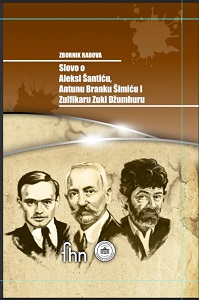
We kindly inform you that, as long as the subject affiliation of our 300.000+ articles is in progress, you might get unsufficient or no results on your third level or second level search. In this case, please broaden your search criteria.

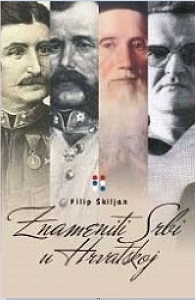
Srbi u Hrvatskoj nisu imali prilike upoznati se sa svojim znamenitim pripadnicima, a koji su na različitim područjima – religiji, umjetnosti, nauci, književnosti i politici – zadužili ne samo narod iz kojeg su potekli, ne samo Hrvatsku iz koje su potekli u kojoj su živjeli i stvarali nego i svijet kojem su svojim djelovanjem, stvaranjem i spoznavanjem doprinosili. Oni sami po sebi zavređuju da o njima održavamo i širimo znanja. Za Srbe u Hrvatskoj oni su važna mjesta identiteta i važna uporišta za njihovu integraciju u hrvatsko društvo. Upoznavanje ne samo Srba sa znamenitim Srbima iz Hrvatske veći i cijele Hrvatske neophodna je pretpostavka i za to da imamo drugačiju Hrvatsku, otvorenu za razlike, otvorenu za svoje veličine neovisno o tome koje su etničke ili vjerske pripadnosti. Hrvatska u kojoj ne bi bilo mjesta ne samo za Preradovića, Teslu i Desnicu, nego i za Rajačića, Milankovića, Runjanina, Viteza, Petrovića, Pribićevića, Nikoliša, Bakića i Mrkalja, ne bi bila Hrvatska otvorena za svoje sugrađane srpske nacionalnosti, niti bi bila Hrvatska koja bi živjela u skladu sa bogatstvom svojeg povijesnog i sadašnjeg identiteta.
More...
Populacija II is a collection of hybrid prose pieces. The pieces are a mix of essays, short stores and autobiographical narratives that the author Goran Bogunović merges to write about ordinary events juxtaposing them to eccentric and peculiar ideas. The resulting products are beautifully witty and insightful stories about musical concerts, writing, and posthumanist sentiments. The narration is laid back, full of humorous details, and apparently unimportant observations that are actually an invitation to a deeper questioning of the nature of things. In his investigations of the strange side of the everyday, he is led by Ry Cooder and Kraftwerk, Sebald and Perec, Captain Beefheart and Kruno Levačić. The implicit message that shapes on the edges of the texts is that man is not the measure of all things, and that the world would go on without him. Various cheerful and wistful forms of the posthumanist sentiment permeate these story-essays that range from simpler and comical to more complex and serious, ending with the beautyful and poetical, eponymous »Population II«. Goran Bogunović was born in 1972, in Zagreb. He graduated from the Faculty of Electronical Engineering and Computing, and from the Faculty of Economics and Business. His literary works have been published in Croatian and foreign journals and magazines, and on the radio. He published collections of poetry Here (Matica hrvatska Karlovac, Karlovac 2002), The Area of High Cloudiness (Naklada Mlinarec — Plavić, Zagreb, 2004), and Things Are Getting More Distant (Edicija Pesničenje, Beograd 2013). He also published short story collections Everything Will Be All Right (Naklada Minarec — Plavić, 2003), and Sloths and Other Stories (Kornet, Beograd, 2007). His poems and stories have been translated into various languages. He played guitar in several bands (Tobić Tobić idol mladih, U pol 9 kod Sabe etc.). He is a producer of several bands. Currently, he plays in the band Radost!
More...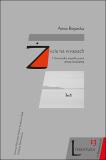
This book is devoted to the study of meanings and functions of the island in contemporary Croatian insular fiction. It is also an attempt to encourage the rejection of simplistic, trivial, strictly tourist representation of the country. The study focuses on eight contemporary works of fiction (seven novels and one collection of short stories written between the 1950s and 2000s) set on the islands off the eastern coast of the Adriatic. They are analysed applying Paul Ricoeur’s method of exploring the symbol, as proposed in “The Symbol Gives Rise to Thought”, the concluding chapter of his volume The Symbolism of Evil. Following his idea, the author of this study indicates four symbols: the desert, the prison, the theatrum mundi and the garden, by means of which she tries to approach the main symbol: the island. She elaborates on each of them on the basis of two different books, proposing two diverse interpretations of the notion in focus and uncovering attendant human experience they convey.
More...
The translator and Indologist Iva Gjurkin wrote a novel Līlā, a story about the growing up of two friends. Gjurkin deftly meanders through their childhood and adolescence, touching upon the important points of maturing in order to speak about finding one's inner peace and content with one's self, through the Indian philosophy of play. The narration is steady and meticulous, without a lack or surplus. It is immersed in the social context of the late 20th century, and still focused on the important matter, with language sharp and precise. Gjurkin's novel is impeccably rounded, permeated by rich and deep Indian philosophy, with the relation of the absolute and the individual, so important for this novel, made available even to less curious readers. Iva Gjurkin graduated in Indian Languages and Literature, and Hungarian Language and Literature at the Faculty of Humanities and Social Sciences in Zagreb. She published essays and literary works in the magazines Scopus, Književna smotra, and Fantom slobode. She translated theroetical and literary tekst for the magazine Libra libera, and the books The Bourgeois: Between History and Literature by Franco Moretti (2015), What is Iconoclah?, From Realpolitik to Dingpolitik – or How to Make Things Public, and Reset Modernity! by Bruno Latour (2017), and Pamphlets of the Stanford Literary Lab, by Franco Moretti et al. (2018).
More...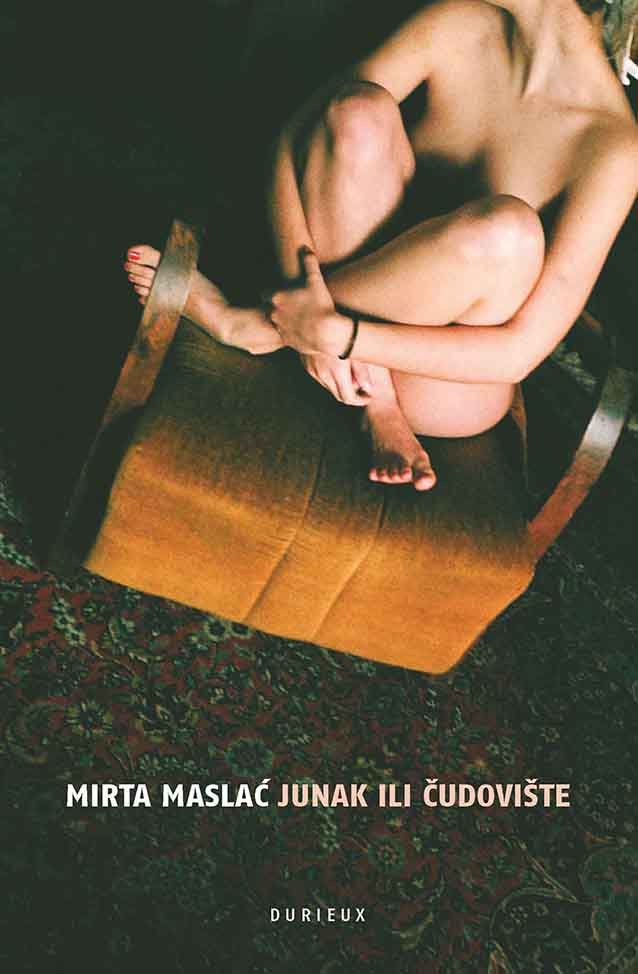
Junak ili čudovište, a novel by Mirta Maslać, is autobiographical in tone, but any stricter categorising would exclude an entire range of its completely heterogeneous elements. This is a diary of an illness and rehabilitation that functions also as a book about pop-culture and art, and about the way that motifs and narratives of the literary avant-garde, rock, and TV series shape our subjectivity. The novel that, besides familiar genre places, offers a merciless insight into the body as the uncanny locus of trauma, presenting the self-destruction without any romanticising. Despite the subdued black humour that colours this whole story, somebody will probably read it as a confession or testimony, a narrative shaping of one's own life in the perspective of existential crisis, maybe even death. But here, the struggle for authenticity is somewhere else, beyond the questions of truthfulness. Hero or Monster shows how, using a certain cultural repertoire, the self can »theatricalise« itself to itself, not for the sake of spectacle, but for the sake of self-reflection. That is the reason this novel is about a peculiar »taming of a monster«: a hard-laboured procedure of discursive creation of something that until now looked only as an unspeakable, unthinkable quantity, trauma generator, and pure danger. This taming is done by writing. Mirta Maslać was born in 1993, in Zagreb. She graduated in comparative literature and Croatian language and literature from the Zagreb Faculty of Humanities and Social Sciences. She published a theoretical study on the vocabulary in drag practices, and the novel Hero or Monster.
More...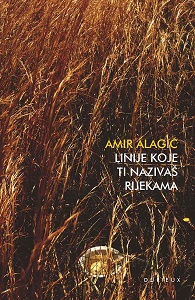
The short story collection The Lines Which You Call Rivers contains both short stories and novellas that testify about Amir Alagić's true talent manifesting itself through authentic narratives, strong images, and daring, rich figurative expressions we have already had the chance to experience in his novels The Sacravenges and Hundred Years' Childhood. Alagić is a master narrator, his reality is tangible, odorous and visible, the events multi-layered and refined with symbolism. The twelve stories, that depict different periods and places, the old age and wasted youth, the devil, curse and madness, show us that Amir Alagić is an important name in our literature, and we should read his works. Amir Alagić was born in 1977, in Banja Luka. So far he has published the novels The Sacravenges (2016), Hundred Years' Childhood (2017), and Tunnels (2019), and the short story collections Under the Same Sky (2010), and The Lines Which You Call Rivers. He published short stories and poems in various literary magazines and anthologies. He wrote a screenply for the short feature film Toying, or a Broken Water Heater (2012). He lives in Pula.
More...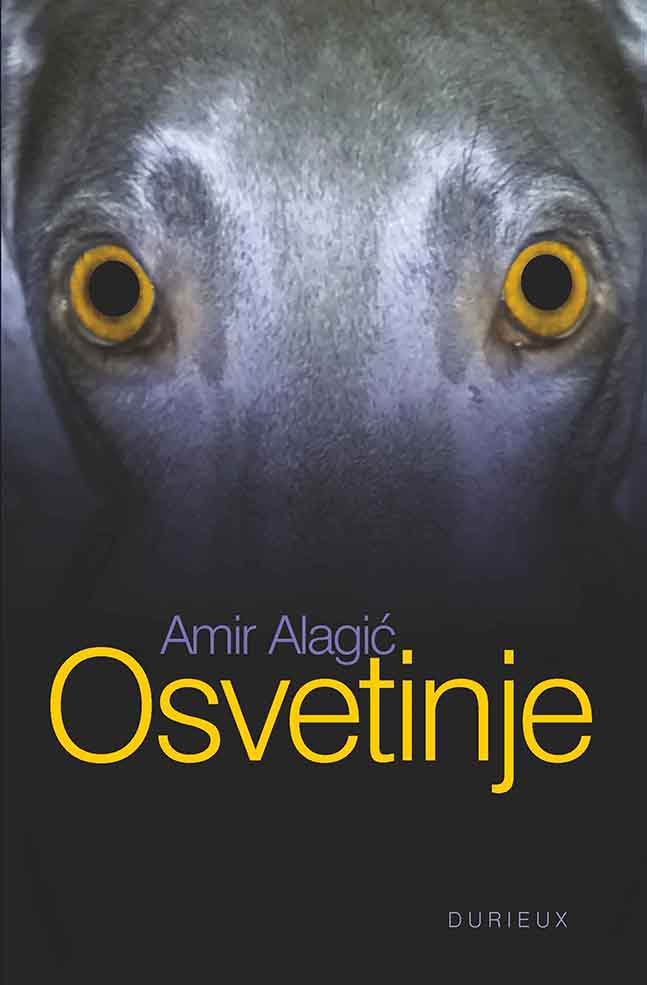
Considering the difficulty of the novel's theme, the composure of narration, and the writing skills, one would not think The Sacravenges was Amir Alagić's debut novel. Alagić elevates the art of narration to an exceptional level, so much so that each of the characters becomes a novel in itself – there is nothing too insignificant for the author, and he is able to discover infinity in details. Sadly, people from the seaside town, which is the novel's setting, dedicate their inner infinity only to revenge. They are crumbling inside like their country that has descended into war. Although aware they are hurling into a terrible eternity, they have decided to taste the infernal agonies during their lifetime. Amir Alagić was born in 1977, in Banja Luka. So far he has published the novels The Sacravenges (2016), Hundred Years' Childhood (2017), and Tunnels (2019), and the short story collections Under the Same Sky (2010), and The Lines Which You Call Rivers. He published short stories and poems in various literary magazines and anthologies. He wrote a screenply for the short feature film Toying, or a Broken Water Heater (2012). He lives in Pula.
More...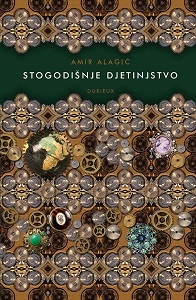
In his debut novel The Sacravenges, Amir Alagić already showed his deep understanding of human soul. There he also elevated the art of description to the highest level, reaching the innermost depths through the exterior surface. In his second novel, Hundred Years' Childhood he ventured farther in developing his art. This time the stage of human drama is the Croatian city of Pula. The time spans across the whole century encompassing not only the contemporary period, but also the First and Second World Wars. The city becomes a real theatrum mundi, an intersection of destinies of different nationalities, where each life becomes a story in itself, and whose familiar localities testify about the transience of life. Amir Alagić was born in 1977, in Banja Luka. So far he has published the novels The Sacravenges (2016), Hundred Years' Childhood (2017), and Tunnels (2019), and the short story collections Under the Same Sky (2010), and The Lines Which You Call Rivers. He published short stories and poems in various literary magazines and anthologies. He wrote a screenply for the short feature film Toying, or a Broken Water Heater (2012). He lives in Pula.
More...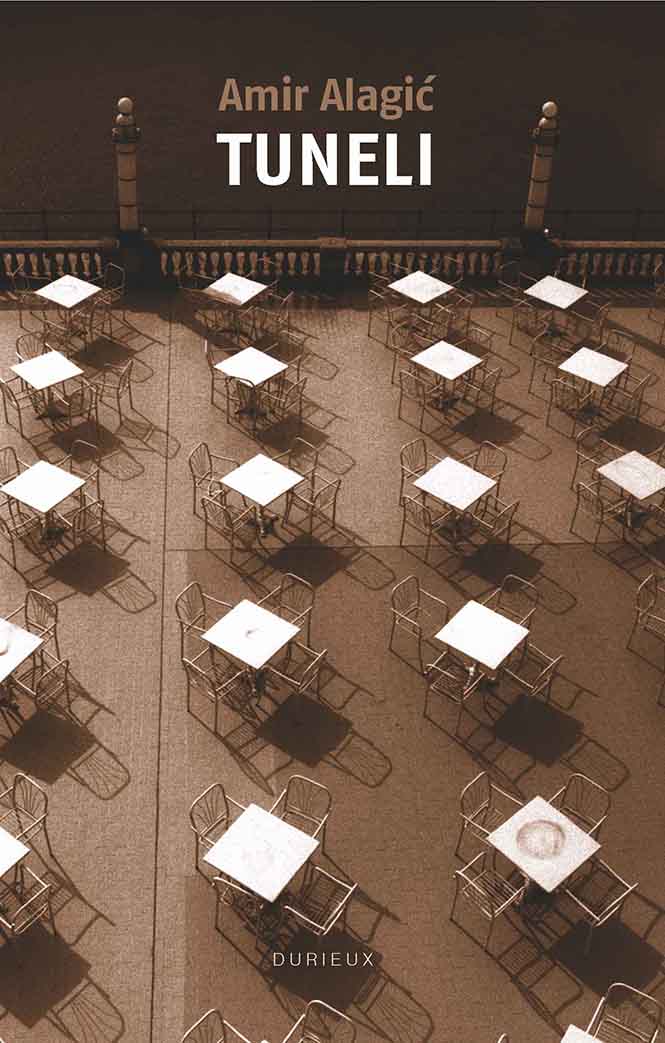
On a New Year's Eve someone – the narrator or destiny – threw their web over the city. In Amir Alagić's new novel, Tunnels, the sudden death of a stranger in a bar multiplies in a game of mirrors. The game reveals that apparently random bar guests are connected by invisible tunnels. If we decide to venture through those tunnels, we will embark on a dangerous journey and risk getting nothing in the end. Maybe there is no light at the end of the tunnel, but it is enough for this fascinating story to light our way. Amir Alagić was born in 1977, in Banja Luka. So far he has published the novels The Sacravenges (2016), Hundred Years' Childhood (2017), and Tunnels (2019), and the short story collections Under the Same Sky (2010), and The Lines Which You Call Rivers. He published short stories and poems in various literary magazines and anthologies. He wrote a screenply for the short feature film Toying, or a Broken Water Heater (2012). He lives in Pula.
More...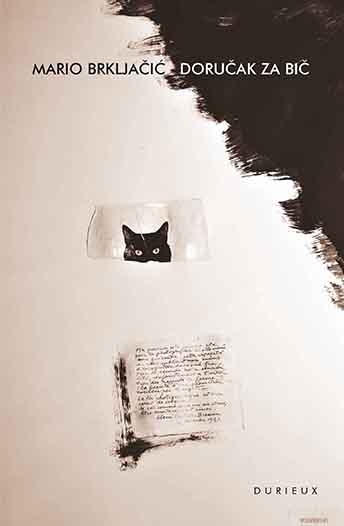
The short story collection Breakfast for Bitch tackles the lives of working-class men who drink, swear and talk in slang, sometimes showing their tender side. It is a ground for both bizarre events, such as swallowing one's dental prosthesis, and the ordinary routine made up of ironing clothes. The stories contain mostly the same characters living the same daily routine that becomes immanent to working-class people who cannot climb up on the social ladder. Whatever the matter, the stories are always witty, told with subdued humour and irony. Life and emotions of those from the margins, the underprivileged and insignificant, swell here, among the glasses of wine and beer. Mario Brkljačić was born in 1966 in Zagreb. He has published poetry and fiction in the magazines Godine nove, Libra Libera, Quorum, Republika, Treći trg, Vijenac and Zarez. With his collection of poems Look Me in the Eyes (2004) he was the winner of the Students Centre competition for the first book. He published books He Never Danced Pogo (2004), A Fly in the Soup (2005), and I Can't Look at Him Like That (2006). Brkljačić's name has become a synonym for the Croatian underground literature that tells the story of working-class people.
More...
The novel Swelter by Iva Ušćumlić, who has shown her remarkable skills with her first novel Ghosts, provides an atmospheric picture of a hot summer in Zagreb, when a woman goes missing, and of the lives of her family that turn into a nightmare. Although the mystery of the missing woman is in the foreground of the story, we cannot classify this book as a crime fiction only. The crime plot intertwines with the inner life of the protagonists, and with an analysis of one love. The text eventually evolves into a metaphysical questioning of that most important of all feelings: what does it consist of, what triggers it, what ends it. As opposed to many other hybrid texts, this novel has no visible seams where the elements of pulp and highbrow literature meet. The narration glides so easily it is difficult to separate the crime story from the metaphysical questions. It all merges into one homogeneous, compact discourse without fissures. The narrator analeptically plays with the plot and the story, with the “now” and “then”, constructing a story that becomes more interesting, real and familiar with each page. The plot that is wedged into a few hot months actually stretches across thirty years, creating a perfect mosaic. Iva Ušćumlić was born in 1977 in Zagreb. She is an author of the highly praised novels Ghosts (2013) and Swelter (2017). She started her career as a journalist. Today the creates various stories, each adapted to its medium, from copywriting in the marketing industry, essays and books, and socially engaged flash fiction, to notes on social networks. The sharp and witty notes brought her on the prestigious list of the biggest influencers on the Balkans. This multitalented author is a passionate photographer, and her photography is, as her writing, very intimate. Both her writing and photography possess a peculiar style, and sophisticated sense of rhythm. Ušćumlić is known for her ad hoc essays where she reinterprets apparently ordinary everyday scenes in an original way that encourages thinking and discussion.
More...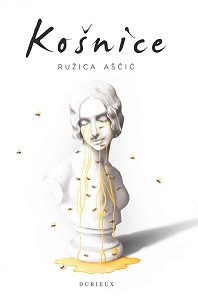
The dramatic trilogy Beehives by the award-winning author Ružica Aščić places in the centre of each play one family with their key problems. The protagonists want more from their life than just passively going with the flow, but their endeavours face the opposition of their community that pushes their desires in the area of unacceptable. Because of the circumstances the characters become apathetic, and too weak to change their situation. The atmosphere of emptiness and hopelessness, realised through apparently empty dialogues, emanates strongly from the texts, and wraps the reader like cobweb. The plays show a reverse gradation of the lack of willpower, and weakness, beginning with the first one, where the desire is clearly articulated but hits the wall repeatedly. In the second play, there is no desire anymore, just the sense of impossibility of realising any closeness. The third play is dominated by the general prohibition of love and humaneness. Ružica Aščić creates Antonioni-like atmosphere of desert where one has difficulty with finding a landmark, not to mention an oasis. Ružica Aščić was born in 1987. She published the short story collection The Good Days of Violence (2016). For the plays It Grows Inside of Me and Beehives she won the »Marin Držić« Award. She has published short stories in numerous Croatian magazines and one of them was included in the anthology Without Doors, Without Knocking: New Croatian Writers of Fiction.
More...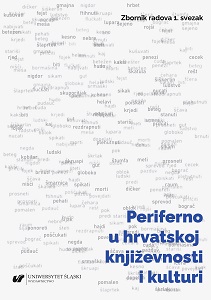
The multi-author monograph titled Peripheries in Croatian Literature and Culture is the result of an international Croatian studies scientific conference held on May 7-9, 2019, which the Croatists of the Institute of Slavonic Philology organized on the occasion of the 25th anniversary of Croatian philology at the Silesian University in Katowice. The speakers delivered 80 papers and the whole conference was attended by about 100 participants. Among them were representatives of many Croatian studies both from Croatia, Montenegro as well as from Poland, Czech Republic, Hungary, Ireland, Germany and Australia. This publication is one of the two parts of the two-volume post-conference book, which consists of texts from the fields of literary and cultural studies. It is divided into three sections, titled: Periferija - teorija, poetika, politika, Čitanje periferije and Na periferiji kanona. The range of topics is very wide: from old Croatian literature (e.g. Kajkavian literature) and folk literature (e.g. the question of the place of folk literature in the history of Croatian literature or the phenomenon of Dalmatian border mentality) to "newer" literature, both prose and poetry, essays and journalism. The monograph also contains several articles dealing with general issues, such as the condition of the humanities in the postmodern world, regionalism, and the attitude of Croats toward Yugoslavia. The authors devote much space to the problem of the canon. There are also articles on television series, comic books and the status of minority literature. The post-conference volumes are edited and published in cooperation with several Croatian university centres. In the case of the literary and cultural studies volume, these are the Croatian Studies departments of the University of Zagreb and of the University of Zadar.
More...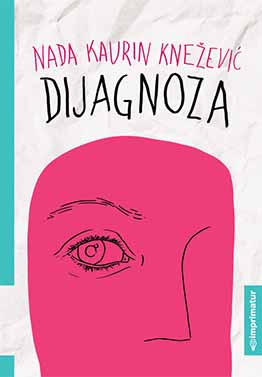
Minimalist, stylistically refined, these dialogical stories, which carry a strong dramatic charge that revolves around the usual and seemingly banal, with their powerful and everyday language will attract every reader and put in front of us a mirror that sometimes mocks us, sometimes comforts us, but most of all it shows us the different modes of modern living. Stories populated by undercover homosexuals who don't have the strength to get out of the closet, people who hide their failures, Instagram addicts and primitive traditionalists, adulterers and failed romantics, open in different faces - me, you, us - and so their grammar suggests who and to whom they speak.
More...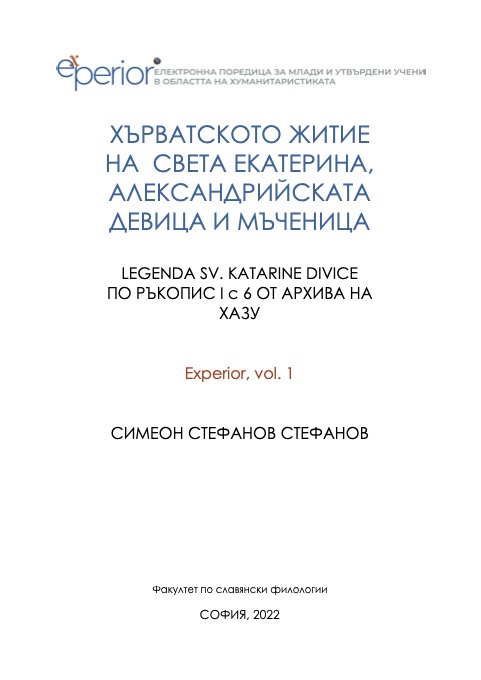
This book offers a new edition with a transliteration and a detailed analysis of the linguistic peculiarities of a little-known in science and hitherto unexplored Medieval Croatian manuscript. This is the vita of St. Catherine “Legenda sv. Katarine divice” according to manuscript I c 6 from the Archives of HAZU. The text was created for the nuns from the Franciscan monastery “St. Ekaterina” in Zadar, was kept in the virgin Benedictine monastery “St. Maria” in Zadar, later became part of the rich book collection of Ivan Kukuljevic, and since 1869 it has been among the manuscripts of the library of the Croatian Academy of Sciences and Arts. It was written in the vernacular from the region of Central and Northern Dalmatia from the period XIV-XV centuries. The writing, spelling, morphology, vocabulary of the selected manuscript are described and analyzed in detail. A special emphasis in the study is placed on the style of Croatian vita. Stylistic analysis overlaps each of the linguistic levels listed above. A supposed Latin prothograph, on which the Croatian translation was probably made, has also been recovered. The results of the textual analysis show that the style of the Croatian vita is unique, rarely influenced by the Latin text and is a testimony rather to the skills and experience of the translator/compiler in the translation/compilation activity.
More...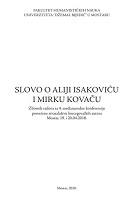
Slovo o Aliji Isakoviću i Mirku Kovaču : zbornik radova sa 4. međunarodne konferencije posvećene stvaralaštvu hercegovačkih autora, Mostar, 19. i 20.04.2018.
More...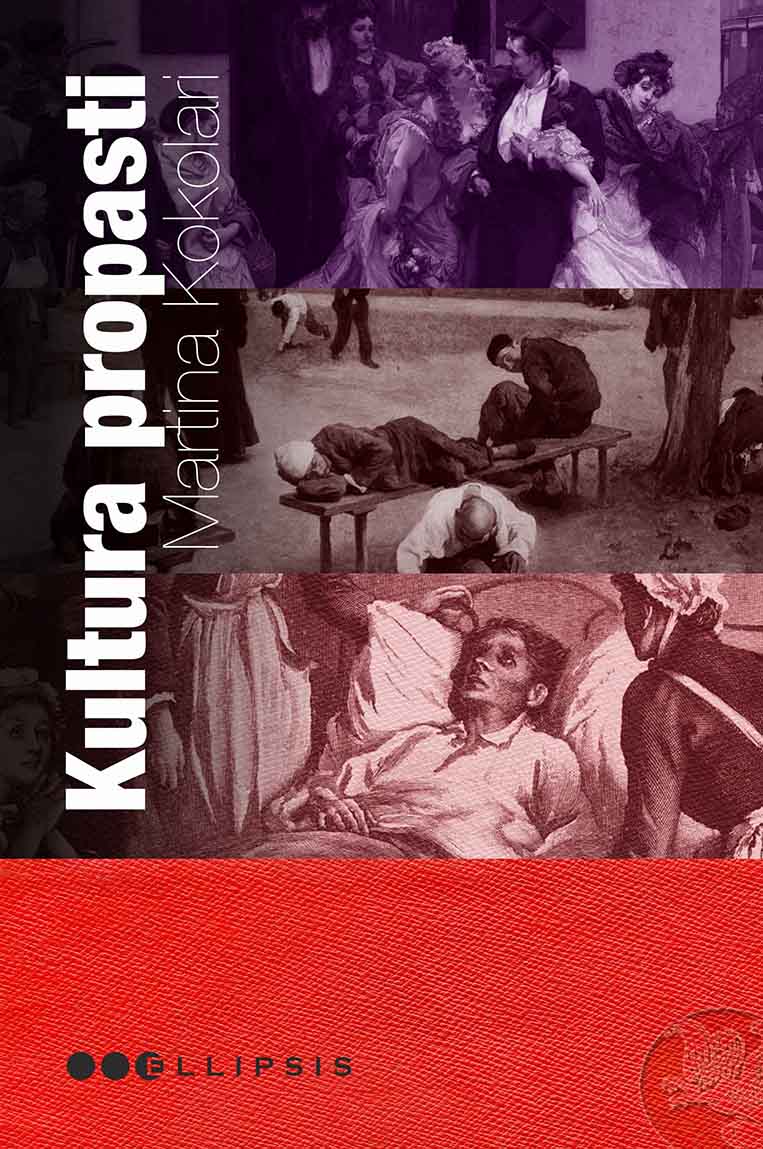
Although it is a difficult task to write comprehensively about decadence, considering the variety of its manifestations, the intention of this book is to show in what ways decadence as a thought pattern and mental disposition, extremely typical of the European fin de siècle, manifested in selected works in Croatian literature at the end of the 19th and beginning of the 20th century. Dealing primarily with the decadent characters, who are considered to be one of the most common characters in the Croatian literature of that period, the author observes decadence as the main mechanism in the typology of male characters: it is the disintegration of identity integrity, awareness of the meaninglessness of the world, specific feeling of inferiority. Read within the frame of fin de siècle historical scepticism and the mal de vivre phenomenon, the analysed works reveal anxious, lost, paralysed characters, who face the nothingness of the world and the consequent inability to establish one’s own identity. Even though the idea of historical decline is by no means characteristic of the 19th century, no other period had such a reputation for pessimism as the fin de siècle. Warning of the complexity of the relationship between literature and extra-literary reality, in order to show by concrete examples how the writers fictionalized the moods of the time, the study presents the spiritual and cultural climate in which the idea of decadence developed and its philosophical foundations. Decadence in Croatia was built on the firm foundation of national psychology, and the reception of European spiritual currents was in many ways determined by the political situation. Withal, the decadence examined is specifically Croatian. Unlike Western decadence or the decadence of the Russian ‘superfluous man’, it is not inherent to members of the upper classes who live in wealth and, in their idleness, indulge in analysis and rumination, but is instead usually tied to ’common’ people, teachers, fallen priests, writers, or (semi-)intellectuals who, often also pressed by material worries, collapse under the weight of frustrating melancholia and anxiety. These dispositions are two sides of the same phenomenon: symptoms of neurosis as the starting- and end-point of all decadent identities. All characters from the analysed texts are burdened with the historical heritage of melancholia, a yearning for the unattainable and lost as well as an all-pervading sorrow, and anxiety, some unclear paralysing fear that prevents them from actively participating in their own lives. But, despite that, the study identifies decadence as a privileged state thanks to which an individual comprehends the foundations of their culture and society, seeing their meaninglessness and corruption.
More...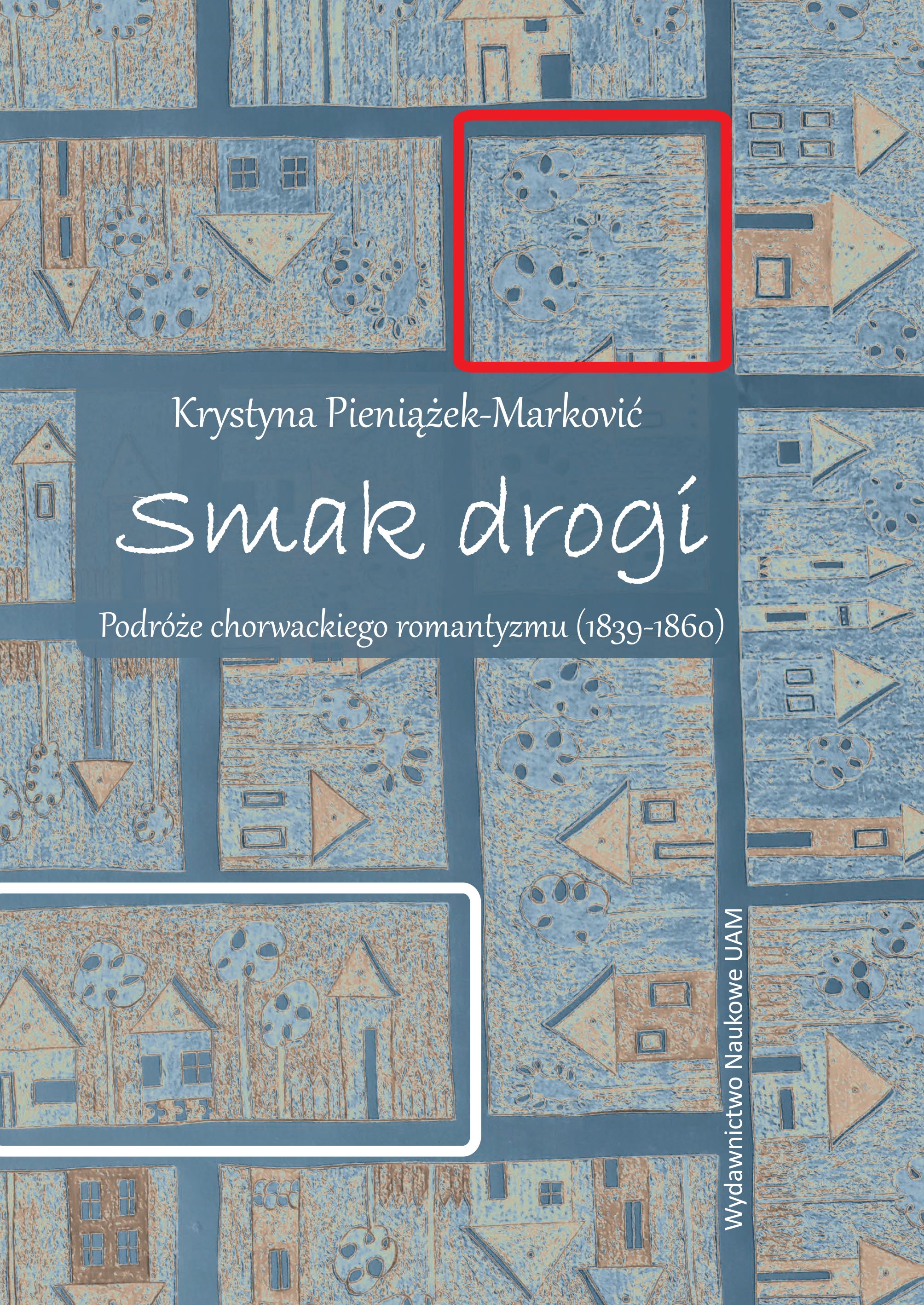
My main interest is in Croatian travelogues, particularly those from between the years of 1839 to 1860. The starting date is the year of the publication of the first Croatian travelogue of the Romantic period (Illyrianism), whose author was Ivan Trnski, but at the same time, these mark the beginnings of Croatian Romanticism. The closing date is connected to the end of Romanticism to the end of absolutism in the years of 1851–1860). Among the best-known travel writers from 1839–1860 period are Ivan Trnski, Matija Mažuranić, Stanko Vraz, Antun Nemčić Gostovinski, Ivan Kukuljević Sakcinski, Adolfo Veber Tkalčević and the Bosnian Franciscans Grgo Martić and Ivan Frano Jukić (functioning within both Bosnian and Croatian literatures). It is to their travels that I devote my attention to, with the focus being all the travel accounts that appeared in book form during this period, Trnski’s accounts published in the press (due to their pioneering character), and also the Franciscans' travels that are important to be able to visualise a comprehensive picture of Bosnia. I therefore focus on an analysis of Croatian nineteenth-century travel writing that is representative of the time and the dominant ideologies, first of the Illyrian Movement (Revival Movement) and then that of Yugoslavism, while illustrating the geographical multi-directionality of Romantic peregrinations.
More...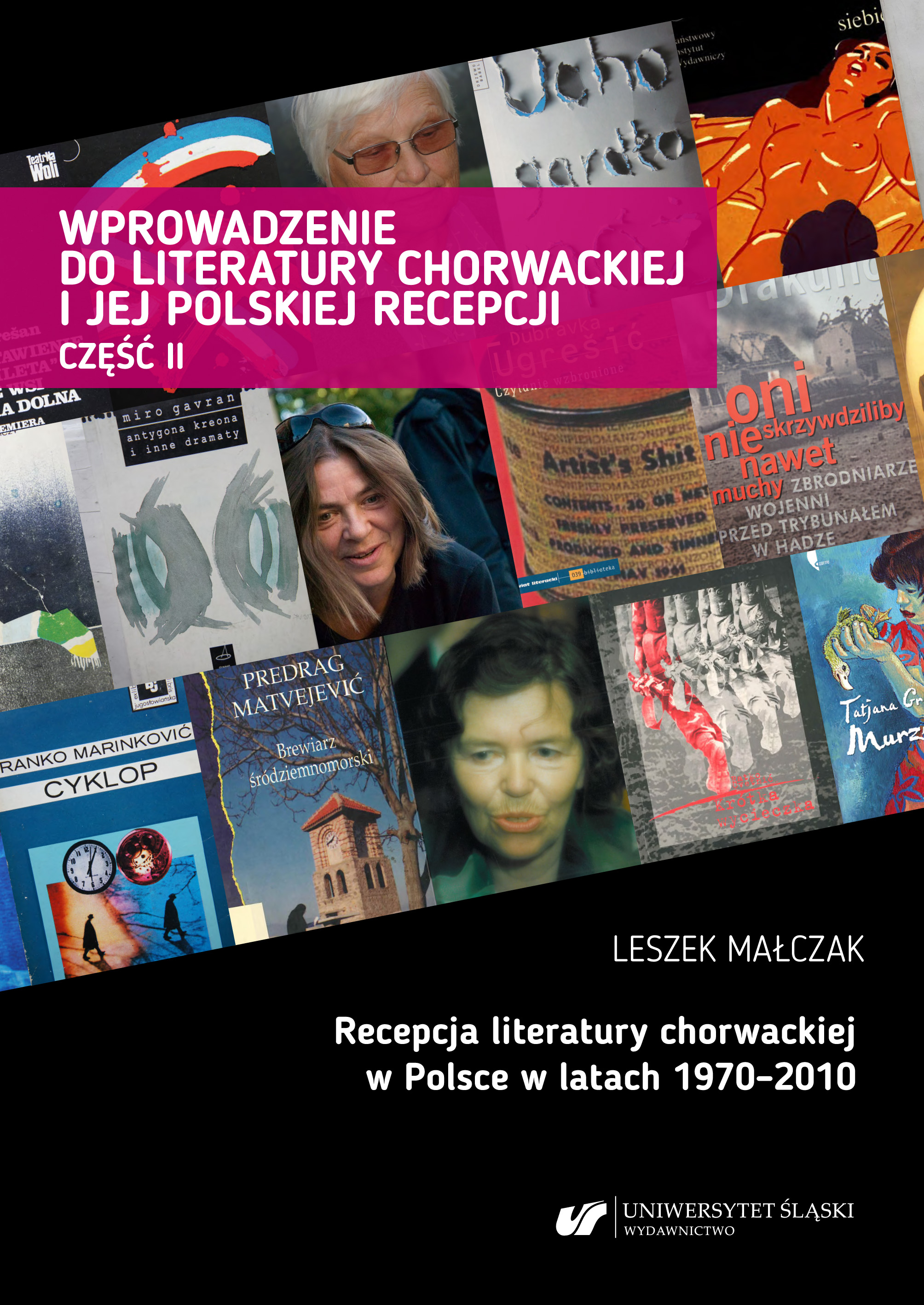
The second part of a new publishing series titled "Introduction to Croatian Literature and its Polish Reception" is devoted to the reception of Croatian literature and culture in Poland in 1970-2010. It is a continuation of "Introduction to Contemporary Croatian Literature (1970-2010)", the first part of the series, written by Krešimir Bagić and translated by Leszek Małczak. This time the view of literary works, as the title reveals, is presented from the Polish perspective. This is a one-of-a-kind study that reveals two worlds of translated literature before and after 1989 that are governed by completely different rules. The author considers the problems of the reception of Croatian literature in Poland in the broad context of translations from other languages with the demonstration of the mechanisms operating at the time in the sphere of interliterary relations. In a review of the publication, Professor Krystyna Pieniążek-Marković notes, among other things, that the book is an absorbing story about Polish cultural and political realities, cultural policy (or lack thereof). The entire period under study is divided into four parts, which are successive decades: the 1970s, 1980s, 1990s and 2000s. The book includes a bibliography of translations, biographies of Croatian writers and information on the translators. An important element of the publication is its graphic design, which through the visual aspect enriches the content and creates a more complete picture of the reception of Croatian literature in Poland.
More...